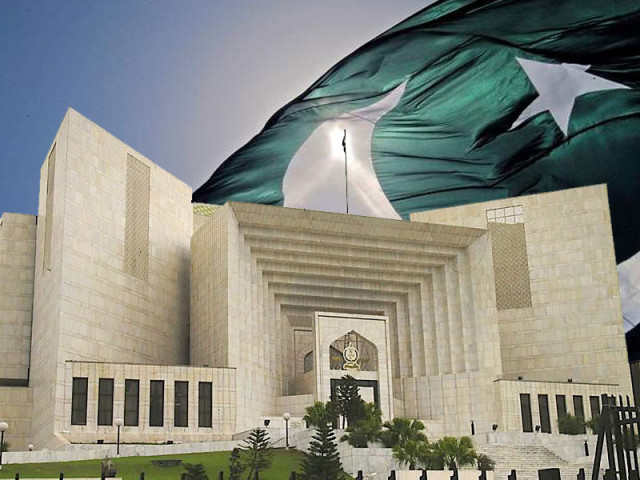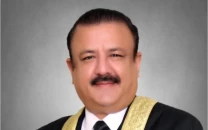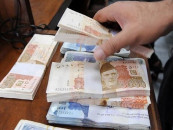PM contempt: 'For whom the bell tolls, it tolls for thee'
Justice Asif Saeed Khan Khosa writes a graphic, bleak additional note to Gilani's contempt order.

PM contempt: 'For whom the bell tolls, it tolls for thee'
Pity the nation that demands justice for all
but is agitated when justice hurts its political loyalty.
This is part of a long addition Justice Asif Saeed Khan Khosa made to Khalil Gibran’s Pity the Nation in a six page additional note that was released with the detailed verdict in Prime Minister Yousaf Raza Gilani’s contempt case.
Justice Khosa, who was part of the seven-member bench that had announced the verdict, says that he is in ‘respectful agreement’ with the proposed judgement authored by Justice Nasirul Mulk.
In a six page addition that he makes to the 77 page detailed verdict, Justice Khosa quotes Khalil Gibran and with "an apology" makes a 321 word addition to Pity the Nation.
He says that Gilani’s conduct in the case is indicative of a bigger malady, one which if not checked or cured may “overwhelm or engulf all of us as a nation.”
Justice Khosa then goes on to quote an extract from For Whom the Bell Tolls by John Donne
Each man’s death diminishes me,
For I am involved in mankind.
Therefore, send not to know
For whom the bell tolls,
It tolls for thee.
Power to the people
Justice Khosa said the ultimate ownership and power of the Constitution, all organs and institutions created under it lies with the people, going on to quote the preamble of the 1973 Constitution:
We, the people of Pakistan ------- Do hereby, through our representatives in the National Assembly, adopt, enact and give to ourselves, this Constitution.
Justice Khosa said that the power to punish a person for contempt of court is also with the people, and through the Constitution they have “entrusted or delegated” this power to the courts.
Emphasising on the power held by the people, Justice Khosa said that in a situation where the executive is bent on defying a judicial verdict and is ready to go to any limit in defiance, it is the responsibility of the people to stand up and defend the Constitution and all organs and institutions to deal with the delinquent appropriately.
It shall simply be naïve to underestimate the power of the people in matters concerning enforcement of their will. The recent phenomenon known as the Arab Spring is too fresh to be ignored or forgotten.
Justice Khosa further cites the example of former president Pervez Musharraf to talk about the power held by the people. He says that Chief Justice Iftikhar Muhammad Chaudhry had refused to obey “unconstitutional dictates” of Musharraf, who had held quite a few divisions. But it was the chief justice who had emerged victorious with the help of the people.
I am not too sure as to how many divisions would a population of over 180 million make!
Collective damnation
Bleak words end the six page additional note. In the conviction of Gilani, says Justice Khosa, lies our collective damnation.
He said Justice Mulk’s order is a step in the right direction as, “It kindles a flame of hope for a future for our nation which may establish a just and fair order, an order wherein the law rules and all citizens are equal before the law.”
The full version of Justice Khosa's addition to Pity the Nation is below:
Pity the nation that achieves nationhood in the name of a religion
but pays little heed to truth, righteousness and accountability
which are the essence of every religion.
Pity the nation that proclaims democracy as its polity
but restricts it to queuing up for casting of ballots only
and discourages democratic values.
Pity the nation that measures honour with success
and respect with authority,
that despises sublime and cherishes mundane,
that treats a criminal as a hero and considers civility as weakness
and that deems a sage a fool and venerates the wicked.
Pity the nation that adopts a Constitution
but allows political interests to outweigh constitutional diktat.
Pity the nation that demands justice for all
but is agitated when justice hurts its political loyalty.
Pity the nation whose servants treat their solemn oaths
as nothing more than a formality before entering upon an office.
Pity the nation that elects a leader as a redeemer
but expects him to bend every law to favour his benefactors.
Pity the nation whose leaders seek martyrdom
through disobeying the law
than giving sacrifices for the glory of law
and who see no shame in crime.
Pity the nation that is led by those
who laugh at the law
little realizing that the law shall have the last laugh.
Pity the nation that launches a movement for rule of law
but cries foul when the law is applied against its bigwig,
that reads judicial verdicts through political glasses
and that permits skills of advocacy to be practised
more vigorously outside the courtroom than inside.
Pity the nation that punishes its weak and poor
but is shy of bringing its high and mighty to book.
Pity the nation that clamours for equality before law
but has selective justice close to its heart.
Pity the nation that thinks from its heart
and not from its head.
Indeed, pity the nation
that does not discern villainy from nobility.


















COMMENTS
Comments are moderated and generally will be posted if they are on-topic and not abusive.
For more information, please see our Comments FAQ